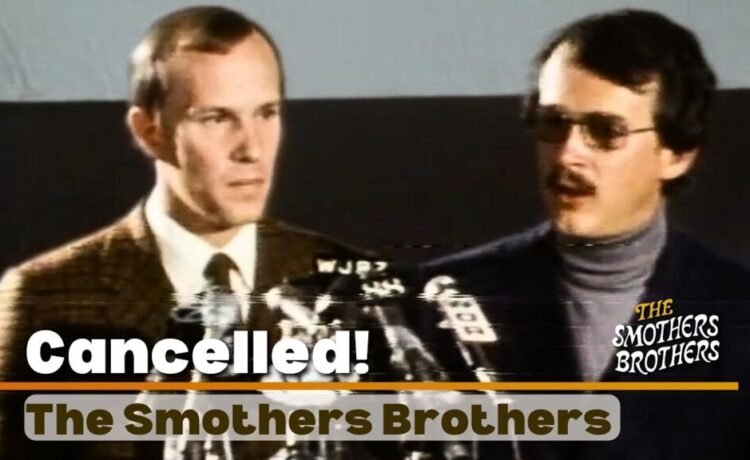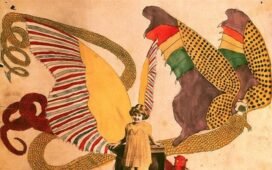Rigorously clean-cut, competent on the acoustic guitar and double bass, and seldom dressed in anything more daring than cherry-red blazers, Tom and Dick Smothers looked like the antithesis of nineteen-sixties rebellion. When they first gained national recognition with their variety show The Smothers Brothers Comedy Hour, they must have come off to many young viewers as the kind of act of which their mother — or even grandmother — would approve. But the brothers’ cultivatedly square, neo-vaudevillian appearance was deceiving, as CBS would soon find out when the two took every chance to turn their program into a satirical, relentlessly authority-challenging, yet somehow wholesome showcase of the counterculture.
The Smothers Brothers Comedy Hour premiered in February of 1967, and its first season “featured minimal controversial content,” writes Sarah King at U.S. History Scene. Thereafter, “the show became increasingly political. The brothers invited activist celebrities onto their show, including folk singers Pete Seeger and Joan Baez and singer-actor Harry Belafonte.
The show also produced its own political material criticizing the Vietnam War and the politicians who supported it,” not least President Lyndon Johnson. Bringing on Seeger was a daring move, given that he’d been blacklisted from network television for the better part of two decades, though CBS’s censors made sure to cut out the most politically sensitive parts of his act.
Even more so was the brothers’ own performance, with George Segal, of Phil Ochs’s “Draft Dodger Rag,” which they ended by urging their audience to “make love, not war.” All this can look fairly tame by today’s standards, but it locked the show — which had become top-rated, holding its own in a time slot against the cultural phenomenon that was Bonanza — into a grudge match with its own network. Before the third season, CBS’ higher-ups demanded that each show be turned in ten days in advance, ostensibly in order to undergo review for sensitive material. In one instance, they claimed that the deadline hadn’t been met and aired a re-run instead, though it may not have been entirely irrelevant that the intended program contained a tribute by Baez to her then-husband, who was being sent to prison for refusing to serve in the military.
CBS did broadcast Baez’s performance on a later date, after clipping out the reference to the specific nature of her husband’s offense. A similar struggle took place around the “sermonettes” delivered by David Steinberg, one of which you can see in the video above. The irreverence toward U.S. foreign policy, religion, and much else besides in these and other segments eventually proved too much for the network, which fired the brothers after it had already given the green light to a fourth season of the Comedy Hour. Though they successfully sued CBS for breach of contract thereafter, they never did regain the same level of televisual prominence they’d once enjoyed, if enjoy be the word. At any rate, the fallout of all this controversy firmly installed the Smothers Brothers in the pantheon of twentieth-century free-speech warriors, and their experience reminds us still today that, without the freedom to give offense, there can be no comedy worthy of the name.
Related content:
Watch Steve Martin Make His First TV Appearance: The Smothers Brothers Comedy Hour (1968)
When The Who (Literally) Blew Up The Smothers Brothers Comedy Hour in 1967
Based in Seoul, Colin Marshall writes and broadcasts on cities, language, and culture. His projects include the Substack newsletter Books on Cities and the book The Stateless City: a Walk through 21st-Century Los Angeles. Follow him on the social network formerly known as Twitter at @colinmarshall.















